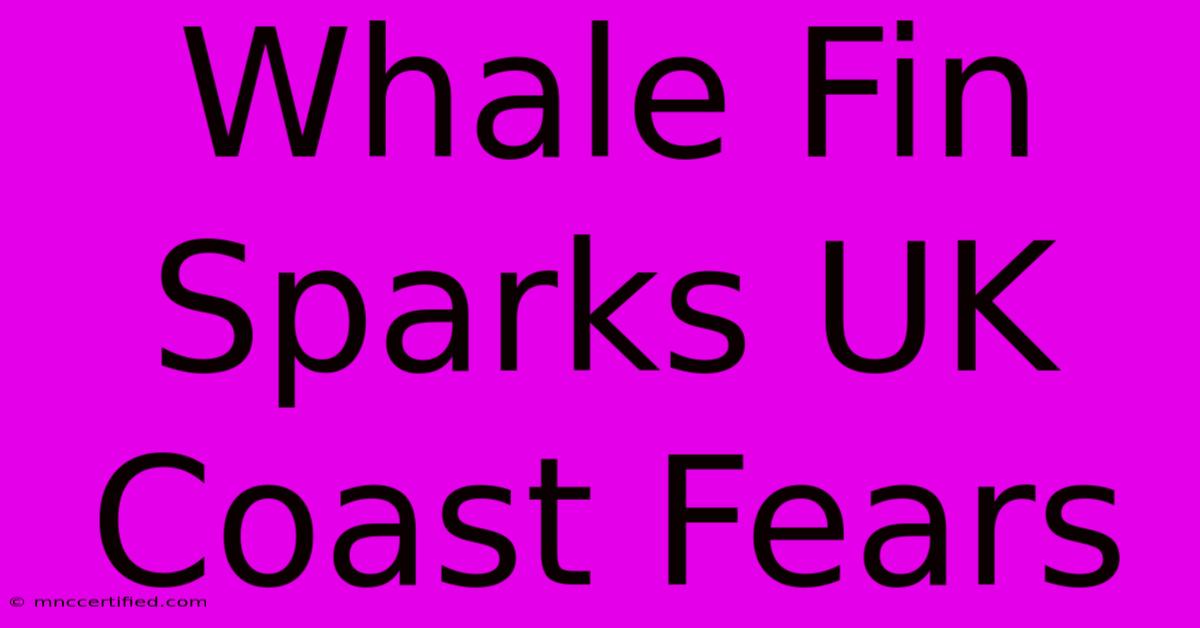Whale Fin Sparks UK Coast Fears

Table of Contents
Whale Fin Sparks UK Coast Fears: A Deep Dive into the Recent Sighting
A recent discovery of a whale fin off the UK coast has sparked widespread concern and ignited a flurry of speculation among marine experts and the public alike. This article delves into the details surrounding this event, exploring the potential implications and highlighting the importance of responsible coastal management and marine conservation.
The Discovery and Initial Reactions
The discovery of the whale fin, believed to belong to a minke whale, was made near [Insert Location – e.g., the Cornish coast] on [Insert Date]. The sighting was reported by [Insert Source – e.g., a local fisherman, a coastal patrol team]. Initial reactions ranged from excitement at the relatively rare sighting of a minke whale in UK waters to apprehension about the whale's health and potential distress. Images and videos circulating on social media have further fueled public interest and debate. The uncertainty surrounding the whale's condition and the lack of immediate information from marine experts have amplified fears.
Why the Concern?
Several factors contribute to the anxieties surrounding this event:
-
Potential for Stranding: A whale fin sighting alone doesn't necessarily indicate a problem, but it raises concerns about the possibility of a whale stranding. Stranded whales are vulnerable and often require extensive rescue efforts. Their survival rate is sadly low without prompt intervention.
-
Environmental Factors: The sighting could indicate underlying issues within the marine environment. Changes in water temperature, pollution, or a reduction in food sources could be impacting whale populations, potentially driving them closer to the coast.
-
Human Impact: Human activity, including boat traffic and noise pollution, can disrupt whale behaviour and contribute to stress. The proximity of the whale to the coast raises concerns about potential human interference.
Expert Opinions and Ongoing Investigations
Marine experts from [Insert relevant organizations – e.g., the British Divers Marine Life Rescue, the Zoological Society of London] are currently monitoring the situation. While there are currently no confirmed reports of a stranded whale, they are urging coastal residents to remain vigilant and report any further sightings immediately. [Insert any official statements or quotes from experts here]. The investigation aims to determine the whale's health, the cause of its proximity to the shore, and any potential threats to its well-being.
The Importance of Responsible Reporting
Accurate and timely reporting is crucial in situations like these. Speculation and misinformation can hinder rescue efforts and create unnecessary panic. Citizens are advised to report sightings to the appropriate authorities, providing clear information about the location, time, and any observable characteristics of the whale. Avoid approaching the whale directly; maintaining a safe distance is essential for both human and whale safety.
Looking Ahead: Strengthening Marine Conservation Efforts
This event underscores the need for continued and strengthened marine conservation efforts in the UK. Protecting whale habitats, reducing pollution, and mitigating the impact of human activities are crucial for the long-term survival of these magnificent creatures. Increased funding for research and rescue operations, combined with public awareness campaigns, can help protect whale populations and prevent future incidents.
What You Can Do:
-
Learn about whales: Educating yourself about whale species, their behaviours, and their conservation status can help you better understand the significance of these sightings.
-
Support conservation organizations: Consider donating to or volunteering with organizations dedicated to marine conservation.
-
Reduce your environmental impact: Make conscious choices to minimize your carbon footprint and reduce pollution, contributing to a healthier ocean environment.
The whale fin sighting serves as a powerful reminder of the importance of marine conservation and the delicate balance of the UK's coastal ecosystem. By working together, we can ensure the protection of these remarkable creatures and their habitats for generations to come. Further updates will be provided as the situation develops. Remember to stay informed through reputable sources.

Thank you for visiting our website wich cover about Whale Fin Sparks UK Coast Fears. We hope the information provided has been useful to you. Feel free to contact us if you have any questions or need further assistance. See you next time and dont miss to bookmark.
Featured Posts
-
Pro Rata Other Insurance Clause
Nov 24, 2024
-
Where To Watch Illinois Vs Rutgers Football
Nov 24, 2024
-
Live Score Virginia Vs Smu Ncaa Football
Nov 24, 2024
-
Suspended Match Millwall Vs Sunderland Medical Issue
Nov 24, 2024
-
Nottingham Forest 0 3 Arsenal Match Summary
Nov 24, 2024